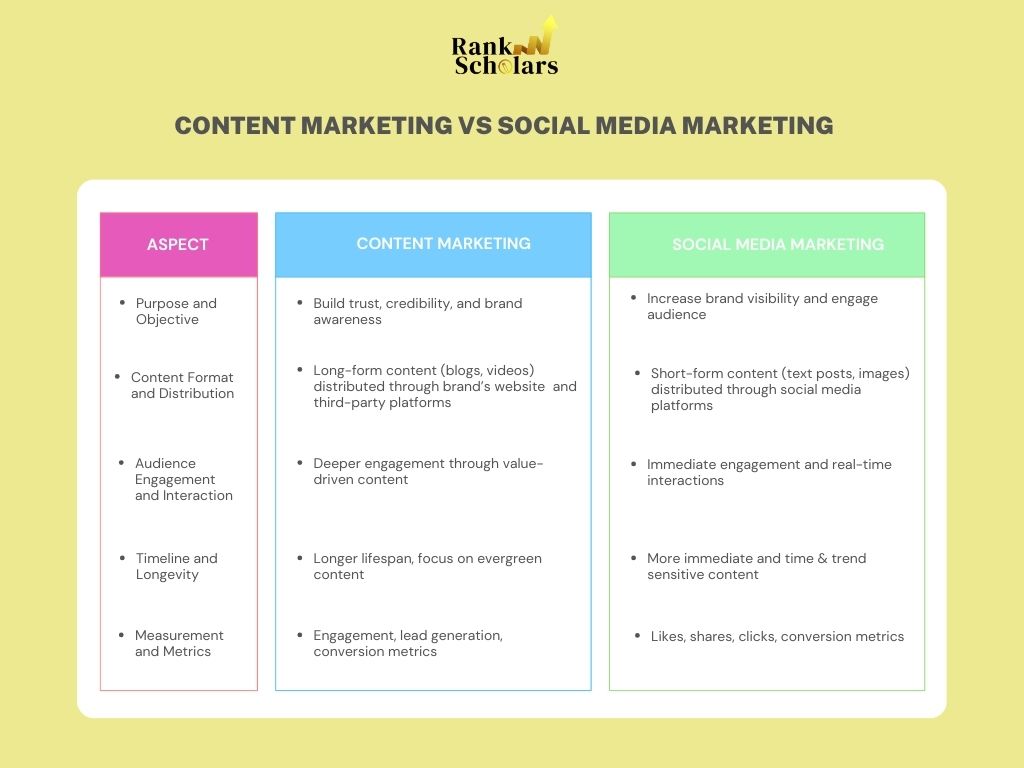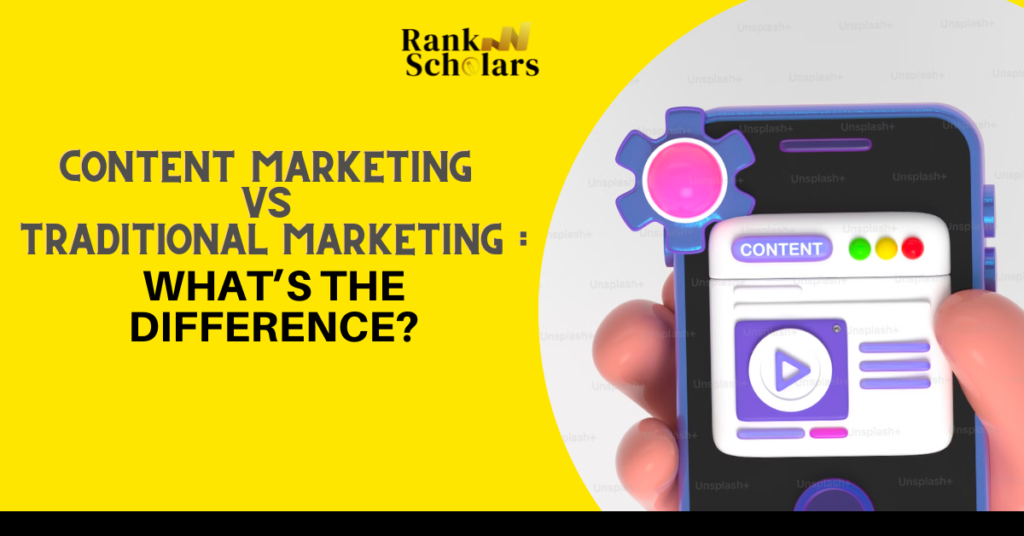For many business owners, the intricacies and distinctions between content marketing and social media marketing are quite unclear. These two terms are often used interchangeably, but their approaches and objectives diverge significantly.
In a nutshell, content marketing showcases what you have to offer, presenting your expertise and solutions to your audience; whereas, through social media marketing you interact with your customers, cultivating relationships and addressing their needs.
Now, the question is, which strategy should you prioritize, or do you need both? Well, each has its strengths and weaknesses, and as a business owner, you need a better understanding of the fundamental differences between the two strategies to make the right decision that aligns with your business objective and resonates with your target audiences.
In this blog post, we have explored the core differences of the “content marketing vs social media marketing” concept to understand what strategy might be most beneficial for your business. So let’s dive in.
What is Content Marketing?
Content marketing strategy focuses on creating and distributing valuable, relevant, and informative content to attract new audiences to your business.
Whereas traditional advertising promotes products or services directly, content marketing aims to produce content that can either educate or entertain them in an informative & engaging way, ultimately driving a conversion.
There are plenty of ways you can create content depending on your target audience, such as,
- Blog posts
- Articles
- Infographics
- Ebooks
- Videos
- In-depth guides
- Podcasts
- Infographics
For instance, imagine you’re a software company specializing in project management tools. Instead of solely focusing on advertising your software, you can embrace content marketing to educate your audience on project management best practices, productivity tips, and industry trends.
By creating in-depth how-to guides, case studies, and webinars that offer practical insights and solutions to common project management challenges you address your audience’s pain points and help them succeed in their roles, which ultimately helps you attract and retain your customers to your business.

What is Social Media Marketing?
Social media marketing is an approach to promoting products, services, or brands through various social media platforms. It involves creating and sharing content tailored to specific platforms and target audiences to build connections, increase brand awareness, drive website traffic, generate leads, and ultimately achieve business goals.
Social media encourages a two-way communication system between customers and brands. There are several social media platforms where you can engage with current and potential customers, such as,
- X (Twitter)
- Instgram
- Tiktok
- YouTube
Businesses use social media marketing to share various content, including text posts, images, videos, polls, and interactive stories. They engage with their audience through comments, likes, shares, direct messages, and live streams, creating opportunities for real-time interaction and feedback.
Let’s consider an example of social media marketing, suppose you own a local fitness studio that wants to attract more clients. So you use social media marketing by posting workout tips, motivational quotes, and success stories on platforms like Instagram and TikTok. As a result, you see an increase in class bookings and memberships, ultimately growing the business through effective social media marketing.
How is Content Marketing Different from Social Media Marketing?

The approach of both content marketing and social media marketing is to boost awareness and drive conversions for businesses. However, there are several differences between the two strategies, such as:
Purpose and Objective
Content marketing focuses on producing valuable and informative content aiming to drive traffic and visitors to a brand’s website. Its primary objective is to provide information, entertain, or offer solutions to the target audience’s needs and interests.
Content marketing builds trust, credibility, and brand awareness over time, ultimately driving profitable customer action.
Social media marketing, on the other hand, focuses on promoting products, services, or brands through various social media platforms and drives engagement through interactions between the brand and its audience.
The main purpose of social media marketing is to increase brand visibility, and drive website traffic, leads, and conversions.
Content Format and Distribution
Content marketing has a wide range of formats, including blog posts, articles, videos, podcasts, infographics, ebooks, whitepapers, and more.
Content is generally distributed through marketing channels such as company websites, blogs, email newsletters, and third-party platforms like Medium or LinkedIn Pulse to reach a wider audience.
Social media marketing often uses short-form content, characterized by concise messaging and impactful visuals such as text posts, images, videos, polls, and interactive stories.
Content is distributed through social media platforms like Instagram, Facebook, Twitter, LinkedIn, Pinterest, and TikTok, to engage with their audience and build a connection between the brand and the customer.
Audience Engagement and Interaction
Content marketing encourages deeper engagement and interaction with the audience through long-form content.
It provides value, fosters trust, and focuses on educating, inspiring, or entertaining the audience, often leading to meaningful conversations, comments, and shares.
Social media marketing thrives on immediate engagement and real-time interactions with the audience.
It encourages likes, comments, shares, direct messages, and live streams, and enables brands to respond promptly to customer inquiries and feedback.
Timeline and Longevity
Content marketing tends to have a longer lifespan, as quality content can continue to attract and engage audiences over time.
Evergreen content, in particular, remains relevant and valuable long after its initial publication, driving ongoing traffic and leads to the website.
Social media marketing often focuses on more immediate and time-sensitive content, such as promotions, announcements, or trending topics.
While social media posts can have a rapid impact and reach a large audience in a short period, their visibility tends to diminish over time as new content is posted every day.
Measurement and Metrics
Metrics for content marketing success include engagement metrics such as time spent on the page, bounce rate, and social shares, as well as lead generation.
Conversion metrics include email sign-ups, downloads, and sales attributed to content, providing insights into the bottom-line impact of content on driving desired actions.
Social media marketing metrics include likes, comments, shares, saves, follows, clicks, reach, and impressions. These metrics not only measure audience engagement but also serve as indicators of content quality and relevance.
Conversion metrics include website visits, form submissions, and purchases attributed to social media campaigns. It provides valuable insights into the effectiveness of social media campaigns in driving tangible results for the business.
Content Marketing vs Social Media Marketing: Which One is Better?
It is not quite possible to answer the question, of choosing between content marketing and social media marketing. Both strategies offer unique advantages and can be highly effective in reaching and engaging with target audiences.
Content marketing is an amazing strategy to approach when it’s about building trust, credibility, and brand authority over time through valuable and informative content. It’s an ideal choice for businesses looking to establish leadership, educate their audience, and foster a long-term relationship with customers.
Content marketing is particularly effective for industries or businesses with complex products or services that require in-depth explanation or demonstration.
Social media marketing campaigns for immediate engagement, real-time interaction, and the ability to reach a large audience quickly. It’s well-suited for businesses looking to increase brand visibility, drive website traffic, and generate leads or conversions in a shorter timeframe.
Social media marketing is beneficial for businesses targeting younger demographics or industries with visually appealing products or services.
Following is a comparative list of the two strategies for you to understand better which one to choose for your business,
Choose content marketing when-
- building brand authority and leadership in the industry is a priority.
- educating the audience about complex products or services is necessary.
- key goals are long-term relationship building and customer loyalty.
- the budget allows for investing in content creation and distribution over time.
Choose social media marketing when-
- increasing brand visibility and reaching a wide audience quickly is a priority.
- driving immediate engagement and interaction with the audience is desired.
- promoting visually appealing products or services is the focus.
- the goal is to drive website traffic, generate leads, or promote time sensitive offers or promotions.
Note that, both marketing works hand in hand. Choosing either one between content marketing and social media marketing might not be the best approach for your business, instead, you can actually benefit from integrating both strategies.
By combining the strengths of content marketing’s long-term value and social media marketing’s immediate impact, businesses can create a comprehensive and cohesive marketing strategy that maximizes their reach, engagement, and conversions.
Content created for content marketing purposes can be repurposed and shared on social media platforms to extend its reach and visibility. Conversely, social media platforms can be used to amplify content marketing efforts and drive traffic to content assets such as blog posts, videos, or whitepapers.
Conclusion
The concept of content marketing vs social media marketing needs to be more accurate, however, as a business owner you need a better understanding of the two strategies. Rather than viewing content marketing and social media marketing as competing strategies, recognize their complementary nature and leverage both approaches strategically to unlock the full potential of your brand and drive maximum benefit for your business.
If you’re looking to invest in content marketing, you should reach out to us today without a second thought.

Sahanaj is a content writer who is passionate about turning ideas into words that inspire positive change.



